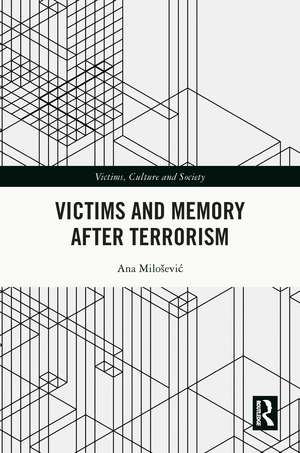Victims and Memory After Terrorism: Victims, Culture and Society
Autor Ana Miloševićen Limba Engleză Hardback – 3 iun 2024
Departing from the prescriptive, legal blueprints of memory, this book introduces the concept of ‘memorial needs’ to challenge and complement existing victimological frameworks. It critically assesses the efficacy of public memorialization and its success in assisting those affected by violence by exploring how victims engage with memory and memorialization. It investigates personal and collective responses to urban terrorism in Europe that have taken a wide range of forms including media coverage, spontaneous memorials and public mobilizations, literary and artistic works, trials, and controversial counter-terrorism measures. Making a case against the fetishization of memory as an overarching answer to curing visible and invisible wounds provoked by violence, Victims and Memory After Terrorism sends out a practical invitation to the field to 'repair symbolic reparations' in a way that memorialisation is not just an expression of potential, an aspiration for a more moral and just society and a promise of healing for the victimised.
An accessible and compelling read, this book will appeal to students and scholars of victimology, criminology, sociology, politics and those interested in the relationship between collective memory and terrorism.
Preț: 1000.27 lei
Preț vechi: 1219.84 lei
-18% Nou
Puncte Express: 1500
Preț estimativ în valută:
191.46€ • 201.15$ • 160.91£
191.46€ • 201.15$ • 160.91£
Carte tipărită la comandă
Livrare economică 12-26 martie
Preluare comenzi: 021 569.72.76
Specificații
ISBN-13: 9781032751511
ISBN-10: 1032751517
Pagini: 164
Ilustrații: 20
Dimensiuni: 156 x 234 mm
Greutate: 0.45 kg
Ediția:1
Editura: Taylor & Francis
Colecția Routledge
Seria Victims, Culture and Society
Locul publicării:Oxford, United Kingdom
ISBN-10: 1032751517
Pagini: 164
Ilustrații: 20
Dimensiuni: 156 x 234 mm
Greutate: 0.45 kg
Ediția:1
Editura: Taylor & Francis
Colecția Routledge
Seria Victims, Culture and Society
Locul publicării:Oxford, United Kingdom
Public țintă
Postgraduate and Undergraduate AdvancedCuprins
1.Victims and memory after terrorism 2.Trauma as a trigger: facing the unthinkable 3.The victim tag: victimhood as a virtue and a burden 4.Dealing with the present: media and terror 5.Architecture of terror: museums, memorials and monuments 6.(Un)bound by memory: commemorating the victims 7.The placebo memory Notes on methodology Index
Recenzii
'This visceral book offers an immersive exploration of post-terror memory. Drawing on years of ethnography conducted across various European terror sites, Ana Milošević brings us close to the stories of victims and the contested work of memorialisation. Raw, tender, and thought-provoking, with a goldmine of methodological reflections to top off.'
Maria Mälksoo, Professor of International Relations, University of Copenhagen
'Provocative and intellectually stimulating, this important study by an outstanding expert in the field is a must-read for anyone interested in the consequences of terrorism for contemporary societies. It takes the reader on a fascinating but painful journey through Western European landscapes of memory, seen through the eyes of those affected by terrorist violence.'
Petra Terhoeven, Professor of European Cultural and Contemporary History, University of Göttingen
'What do memorials to terrorist attacks actually do? Does commemoration heal the trauma of survivors, or are public memorials a 'placebo' which ritually enact healing? In this fascinating new sociology of terrorism commemoration, Ana Milosevic explores the dynamics which have led us to memorialise some terrorist attacks, but not others.'
Charlotte Heath-Kelly, Professor of Politics and International Studies, University of Warwick
'Based on an extensive and fascinating fieldwork, Ana Milosevic’s Placebo memory makes a major contribution to the understanding of the social effects of terrorism, what it means and what it costs to be a victim of it, and what memory politics can do about it. If we were to read only one book about victims of terrorism and memory, it would be this one.'
Gérôme Truc, Tenured Research Fellow in Sociology, French National Center for Scientific Research
'The Placebo Memory is a bold and thought-provoking analysis of the victims' needs after terrorism. It offers timely and important answers on how we can better understand remembrance and symbolic reparations from the victims' perspective.'
Aleksandra Ivankovic, Deputy Director (Victim Support Europe) and Operations Manager (EU Center of Expertise for Victims of Terrorism)
Maria Mälksoo, Professor of International Relations, University of Copenhagen
'Provocative and intellectually stimulating, this important study by an outstanding expert in the field is a must-read for anyone interested in the consequences of terrorism for contemporary societies. It takes the reader on a fascinating but painful journey through Western European landscapes of memory, seen through the eyes of those affected by terrorist violence.'
Petra Terhoeven, Professor of European Cultural and Contemporary History, University of Göttingen
'What do memorials to terrorist attacks actually do? Does commemoration heal the trauma of survivors, or are public memorials a 'placebo' which ritually enact healing? In this fascinating new sociology of terrorism commemoration, Ana Milosevic explores the dynamics which have led us to memorialise some terrorist attacks, but not others.'
Charlotte Heath-Kelly, Professor of Politics and International Studies, University of Warwick
'Based on an extensive and fascinating fieldwork, Ana Milosevic’s Placebo memory makes a major contribution to the understanding of the social effects of terrorism, what it means and what it costs to be a victim of it, and what memory politics can do about it. If we were to read only one book about victims of terrorism and memory, it would be this one.'
Gérôme Truc, Tenured Research Fellow in Sociology, French National Center for Scientific Research
'The Placebo Memory is a bold and thought-provoking analysis of the victims' needs after terrorism. It offers timely and important answers on how we can better understand remembrance and symbolic reparations from the victims' perspective.'
Aleksandra Ivankovic, Deputy Director (Victim Support Europe) and Operations Manager (EU Center of Expertise for Victims of Terrorism)
Notă biografică
Ana Milosevic is a Post-Doctoral Researcher at the Institute for Criminology, KU Leuven, Belgium.
Descriere
This book contributes to the study of collective memory and the sociology of terrorism by analysing the role of memorialization in relation to terrorism, its victims, and the broader society.














